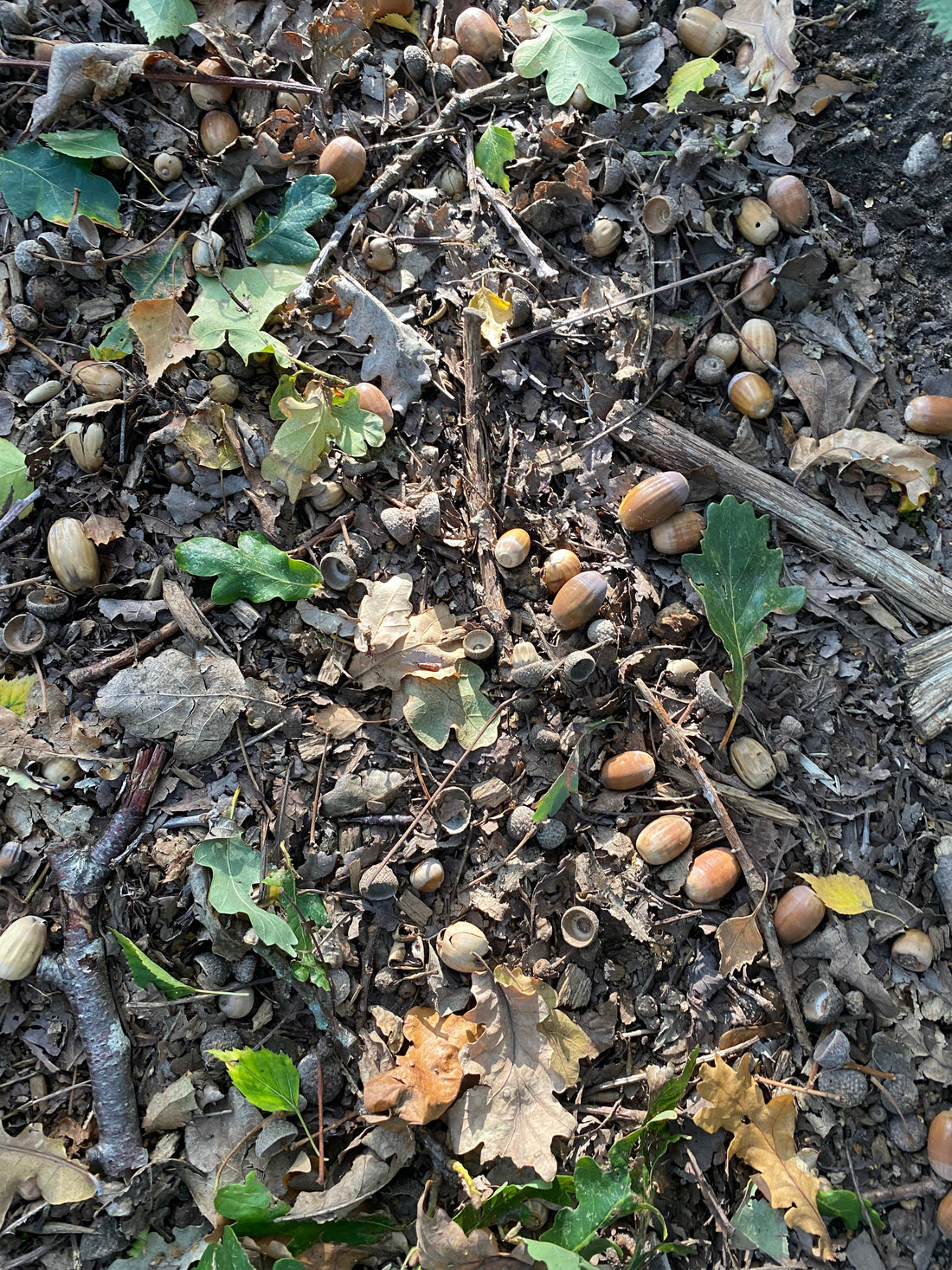
The Recipe Problem
Share
My daughter was explaining to her new friend how to make ink from oak galls today, sharing knowledge she'd never actually tried herself. She spoke with complete confidence about something we'd only read in a book, generous with what she knew without needing to be an expert first.
I love this fearlessness. To her, learning means trying things out, sharing what you discover, adapting when things don't go exactly as planned. She doesn't wait for permission or perfection.
We were foraging in Sherwood Forest because the "recipe" called for smooth, round oak galls - the best ones for making dark black ink. But there weren't many of those. Plenty of knobbly, textured ones though. So we gathered those instead, along with acorn caps. We'll see what happens.
This willingness to substitute, to experiment, to trust the process even when you don't have exactly the "right" ingredients - that's real knowledge. Not following instructions blindly, but understanding the principles well enough to adapt when circumstances change.
It reminds me of how my grandmother cooked. She'd taste as she went, add a bit more of this, substitute something else when she didn't have the exact ingredient. The recipe was a starting point, not gospel. Through years of iteration - trying, tasting, adjusting - she'd built that knowledge in her bones. She trusted herself to know when something needed more salt or less cooking time.
Real learning happens this way. You try something, look at how it turns out, try something different next time and observe. Gradually you develop intuition, the confidence to trust your own judgement.
But somewhere along the way, we've been systematically trained out of this confidence.
My drawing pens can't be refilled - when the ink runs out, the entire pen goes in the bin. The message is clear: don't try to fix it, don't try to understand it, just buy another one.
At the expensive end, it's even worse. When my printer stops working, I don't dare open it up to see what's wrong. What if I break those tiny plastic clips? What if I void the warranty on something that cost hundreds of pounds? The cost of getting it wrong is too high, so I don't even try to learn.
This isn't accidental. Things are designed to discourage experimenting. Sealed units you can't open. Proprietary parts you can't replace. Warranties voided by curiosity. Whether it's a £2 pen or a £500 printer, the system trains us in learned helplessness.
But it's not just the products themselves. The way we live our lives also discourages experimentation. Experimentation is time intensive. It's not the quick option. It requires patience, and so many of us are so busy that it's easier to just buy the answer to our problems instead of working towards a solution.
But what are we giving up by not spending that afternoon figuring things out? I think we might be trading away our humanity itself.
What makes us human? Our imagination - our ability to dream about how things might be different. Our capacity to solve problems, to create with our hands, to understand our world through touch and experimentation. Problem solving and creating exercises this imagination, keeps it alive.
When we outsource every solution, every repair, every creative process, we lose touch with what connects us to each other and to the earth. We become consumers rather than makers, buyers rather than learners.
My grandmother didn't just cook - she understood food, seasons, preservation, the alchemy of transforming raw ingredients into nourishment. She wasn't just following recipes; she was participating in an ancient human practice of care and creativity.
I'm hoping to develop something similar with my drawing practice. Our ancestors had to create with what nature gave them - they knew which plants made which colours, how different materials behaved, what worked and what didn't through seasons of experimentation. They had deep knowledge and intuition about their materials that I can only dream of right now.
But I'm starting to experiment. I've recently made some elderberry inks, now these oak galls. Each batch teaches me something new about colour, about how natural materials behave, about what's possible when you're not limited to what's available in the art shop.
I'm not saying we should all go back to grinding our own pigments (but I absolutely intend on doing some of that!). But maybe we've swung too far towards convenience, away from understanding.
We forget that humans used to figure things out for themselves.
My oak gall ink experiment is radical because I can afford to get it wrong. If the first batch doesn't work, I gather more materials and try again. The forest is forgiving. What if I discover a beautiful new colour I didn't know was possible? What if the "mistake" becomes the best part of the whole experiment?
This is how we learn to trust ourselves again - through projects where the cost of failure is low and the joy of discovery is high.
What if we looked for more of these opportunities? What if we remembered that recipes are starting points, not commandments?
Maybe start with just one thing - something small, something where you can afford to play. Where you can slow down enough to trust your own hands, your own judgement, your own curiosity.
What would you choose to experiment with?